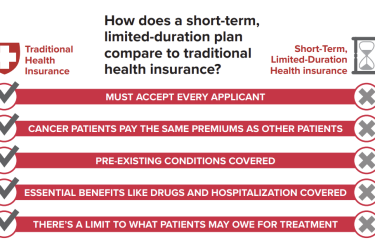 When the Affordable Care Act was passed in 2010, one of its clear intents was to create a lot more consistency in health coverage across the country. Coverage wouldn’t be completely uniform and 100 percent Washington-imposed. States would still have a lot of regulatory powers over insurers if they chose to exercise it, and some freedom to experiment and modify their own programs, particularly Medicaid. But the state-to-state disparity in uninsurance rates and access to coverage was supposed to have been ironed out.
When the Affordable Care Act was passed in 2010, one of its clear intents was to create a lot more consistency in health coverage across the country. Coverage wouldn’t be completely uniform and 100 percent Washington-imposed. States would still have a lot of regulatory powers over insurers if they chose to exercise it, and some freedom to experiment and modify their own programs, particularly Medicaid. But the state-to-state disparity in uninsurance rates and access to coverage was supposed to have been ironed out.
That’s not what happened – and under the Trump administration states have even more choices – including new options to undermine the ACA. On April 13 at Health Journalism 2018 in Phoenix, we’ll have a panel called “States and health care in the age of Trump: Wishes and waivers” to look at what will probably be the most pivotal period of state health care activity yet.
Over the past few years, we’ve seen that not all states fully implemented the ACA. They didn’t all run their own exchanges (letting the federal government do that through HealthCare.gov). They varied in how much outreach they did, and how hard governors, legislators and regulators worked (if at all) to make the markets run as well as possible. Nearly 20 states still have not expanded Medicaid – expansion became optional rather than mandatory under the 2012 Supreme Court ruling. Uninsurance rates have dropped everywhere – but not uniformly, as this data from the Kaiser Family Foundation shows.
Under the Trump administration states have even more choices – and some (notably Idaho) will be pushing the legal envelope even beyond what Washington, D.C., currently allows. We’ll have four panelists joining us to discuss trends at the state level. How far can states go to move away from the ACA? What are some of the pros/cons of states allowing skimpier insurance? Can states move to shore up the ACA, if Washington is still weakening it? And how far will Trump’s HHS go in allowing states to add conservative features to Medicaid – including, potentially, time limits for coverage.
Joining us will be:
- Larry Levitt, senior vice president for special initiatives, senior adviser to the president, Kaiser Family Foundation
- Hemi Tewarson, director, National Governors Association Center Best Practices Health Division
- Grace-Marie Turner, president, The Galen Institute
- Daniel Derksen, M.D., Walter H. Pearce endowed chair, Community, Environment and Policy Department; director, Arizona Center for Rural Health, University of Arizona
Follow along on Twitter with #AHCJstates. See you there!
More from the Road to Phoenix:
Note: Pre-registration closes at noon CT on March 12.







